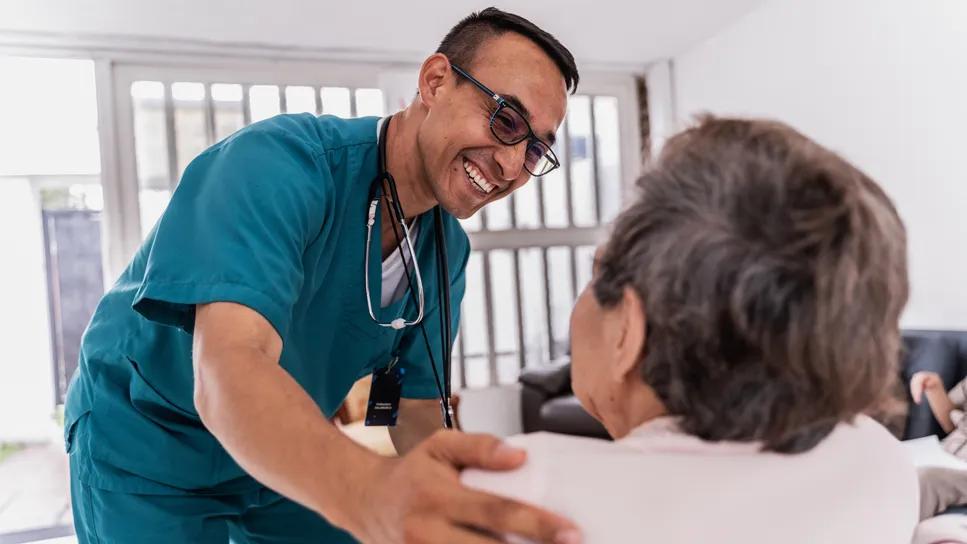Care geared toward older adults can improve outcomes

By 2030, all baby boomers in the U.S. will be over 65 years old, expanding the size of the older population to 20% of all residents, according to the U.S. Census Bureau. That will present unique demands on the healthcare industry. Among those prepared to care for older adults are a team of geriatric resource nurses (GRNs) at Cleveland Clinic. GRNs are expert clinical nurses who recognize the special needs of older adults, serve as consultants for peers and educate other caregivers on best practices in geriatric nursing.
Advertisement
Cleveland Clinic is a non-profit academic medical center. Advertising on our site helps support our mission. We do not endorse non-Cleveland Clinic products or services. Policy
“Specialized care for older adults as a population is often under-recognized,” says Julie Simon, MSN, APRN, AGCNS-BC, CMSRN, a clinical nurse specialist in the Cleveland Clinic healthcare system and co-coordinator of its geriatric resource nurse program. “They are often vulnerable and deserve specific care for their age group.” The challenges facing many adults 65 and older include chronic health conditions, cognitive health issues and physical injuries, such as falls.
Cleveland Clinic has GRNs at most of its hospitals. In addition, most of the facilities are also NICHE members (Nurses Improving Care for Healthsystem Elders). “Coordinators at each hospital plan geriatric initiatives for the health system and spread successful best practices,” says Simon.
Like many nurses, Simon and her GRN program co-coordinator, Erica Yates, MSN, RN-BC, APRN, ACNS-BC, CRRN, were inspired by someone in their own lives to serve older patients. “I had a great-grandmother who lived to be 99 years and 11 months old,” says Yates, a clinical nurse specialist at Cleveland Clinic’s main campus. “She was the most amazing woman!”
Geriatric resource nurses perform numerous functions, including the following:
Advertisement
Recently, the GRNs at Cleveland Clinic rounded and educated nurses during a roll-out of the Pain Assessment in Advanced Dementia (PAINAD) tool for patients with dementia and delirium. They also are rounding on nursing units to discuss the Age-Friendly Health Systems initiative from The John A. Hartford Foundation and the Institute for Healthcare Improvement. “The initiative focuses on the 4Ms framework for caring for older adults – what matters, medication, mentation and mobility,” says Yates. “If you look at all those things as a bundle for older adult patients, you can really impact their outcomes.”
In the spring, 45 nurses received training to become GRNs in the Cleveland Clinic healthcare system. The two-day training program features an in-person class and online modules. Topics include recognizing differences in disease presentation for older adults, assessing for delirium and dementia, communicating effectively with seniors, respecting each patient’s individuality, getting patients back to their baseline and nursing interventions specific to older adults.
In addition to the training program, GRNs are offered other continuing education opportunities. In May, many of them attended the conference Geriatrics: Your Future Is Now. Hosted by Cleveland Clinic Euclid Hospital, the one-day conference including lectures on diagnosis of Alzheimer’s Disease, palliative care and ethics, immunizations for older adults, new guidelines for stroke and continuum of care and geriatric trauma.
Advertisement
As coordinators of Cleveland Clinic’s GRN program and NICHE coordinators in the healthcare system, Simon and Yates offer a few tips for healthcare organizations that would like to launch a similar program:
Advertisement
Support of the GRN program benefits patients at Cleveland Clinic. As one example, Simon and Yates recently rounded with a GRN on a patient with cognitive impairment. “When we walked in, the patient was visibly agitated and upset,” recalls Simon. “She was trying to get across that she needed to use the restroom, but the patient care nursing assistant (PCNA) didn’t understand because she had just taken the patient to the restroom.” Simon and the GRN explained to the PCNA that older patients with cognitive impairment may become agitated when they have unmet needs. They walked the patient to the restroom and, afterward, her needs were met and she was calm.
“There was a visible difference in her behavior, and we were able to educate the PCNA and use the situation as a learning experience for the nurse,” says Simon. “It was an opportunity for the GRN to see geriatric principles she learned in action.”
Advertisement
Advertisement

Researchers explore the mental and physical benefits of social prescribing

Multidisciplinary approach helps address clinical and psychosocial challenges in geriatric care

Effective screening, advanced treatments can help preserve quality of life

Study suggests inconsistencies in the emergency department evaluation of geriatric patients

Auditory hallucinations lead to unusual diagnosis

How providers can help prevent and address this under-reported form of abuse

How providers can help older adults protect their assets and personal agency

Recognizing the subtle but destructive signs of psychological abuse in geriatric patients